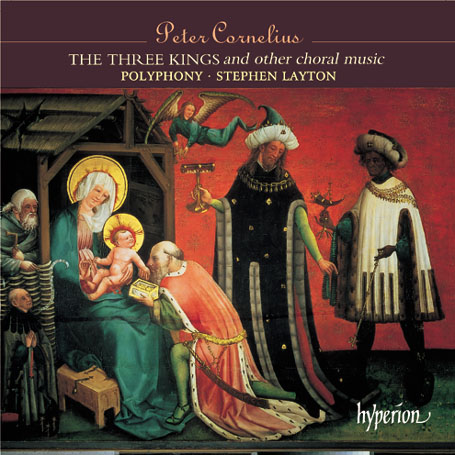Cornelius Choral Works
Wagnerian without the intensity, Lisztian but less experimental, Cornelius’s well-crafted works have a charm of their own
View record and artist detailsRecord and Artist Details
Composer or Director: (Carl August) Peter Cornelius
Label: Hyperion
Magazine Review Date: 12/2000
Media Format: CD or Download
Media Runtime: 72
Mastering:
DDD
Catalogue Number: CDA67206

Tracks:
| Composition | Artist Credit |
|---|---|
| Requiem, 'Seele, vergiss sie nicht' |
(Carl August) Peter Cornelius, Composer
(Carl August) Peter Cornelius, Composer Polyphony Stephen Layton, Conductor |
| (Die) Vätergruft |
(Carl August) Peter Cornelius, Composer
(Carl August) Peter Cornelius, Composer Polyphony Robert Rice, Baritone Stephen Layton, Conductor |
| (3) Chorgesänge |
(Carl August) Peter Cornelius, Composer
(Carl August) Peter Cornelius, Composer Polyphony Stephen Layton, Conductor |
| (6) Weihnachtslieder, Movement: Die Könige, 'The Three Kings' |
(Carl August) Peter Cornelius, Composer
(Carl August) Peter Cornelius, Composer Polyphony Robert Rice, Baritone Stephen Layton, Conductor |
| Liebe: ein Zyklus von Drei Chorliedern |
(Carl August) Peter Cornelius, Composer
(Carl August) Peter Cornelius, Composer Polyphony Stephen Layton, Conductor |
| (Der) Alte Soldat |
(Carl August) Peter Cornelius, Composer
(Carl August) Peter Cornelius, Composer Polyphony Stephen Layton, Conductor |
| (3) Psalmlieder |
(Carl August) Peter Cornelius, Composer
(Carl August) Peter Cornelius, Composer Polyphony Stephen Layton, Conductor |
| So weich und warm |
(Carl August) Peter Cornelius, Composer
(Carl August) Peter Cornelius, Composer Polyphony Stephen Layton, Conductor |
| (5) Trauerchöre |
(Carl August) Peter Cornelius, Composer
(Carl August) Peter Cornelius, Composer Polyphony Stephen Layton, Conductor |
| Trost in Tränen |
(Carl August) Peter Cornelius, Composer
(Carl August) Peter Cornelius, Composer Colin Campbell, Baritone Polyphony Stephen Layton, Conductor |
Author: John Warrack
Peter Cornelius was one of the most sympathetic of all those musicians who were drawn into the orbit of Wagner and Liszt, and it says much for this gentle, pious man that he was able to escape unscathed and without losing their affection. ‘He burns, and robs me of air,’ Cornelius once complained to his brother about Wagner. Breathing more freely, he developed an idiom which owes much to both mentors but also draws, in an individual manner, upon his German heritage. The choral works recorded here derive largely from the tradition of amateur choral societies, as James Deaville’s excellent note makes plain while also properly warning against amateurs attempting some of Cornelius’s more elaborate pieces (for instance, the three of Op 11). These are finely sung here, as in particular is the Requiem, which sets not the Mass for the Dead but a poem by another of Cornelius’s difficult friends, the poet Friedrich Hebbel (author of the darker elements in Schumann’s Genoveva libretto).
Cornelius also liked to draw upon earlier music as a basis for his invention, such as plainchant (in some solo songs with piano, Op 2) or, here, upon Lutheran chorale and a surprisingly successful pastiche setting of Schubert’s Death and the Maiden. Despite these contrapuntal forays, his manner in general is homophonic, rich harmonically, but lacking the intensity of which Wagner was capable, or the strange experimentalism of Liszt’s last phase. It is all very well written for voices, and if the music is never going to find a wide audience, it can through its admirable craftsmanship and touching sincerity have an appeal that goes on deepening with familiarity.'
Cornelius also liked to draw upon earlier music as a basis for his invention, such as plainchant (in some solo songs with piano, Op 2) or, here, upon Lutheran chorale and a surprisingly successful pastiche setting of Schubert’s Death and the Maiden. Despite these contrapuntal forays, his manner in general is homophonic, rich harmonically, but lacking the intensity of which Wagner was capable, or the strange experimentalism of Liszt’s last phase. It is all very well written for voices, and if the music is never going to find a wide audience, it can through its admirable craftsmanship and touching sincerity have an appeal that goes on deepening with familiarity.'
Discover the world's largest classical music catalogue with Presto Music.

Gramophone Digital Club
- Digital Edition
- Digital Archive
- Reviews Database
- Full website access
From £8.75 / month
Subscribe
Gramophone Full Club
- Print Edition
- Digital Edition
- Digital Archive
- Reviews Database
- Full website access
From £11.00 / month
Subscribe
If you are a library, university or other organisation that would be interested in an institutional subscription to Gramophone please click here for further information.




